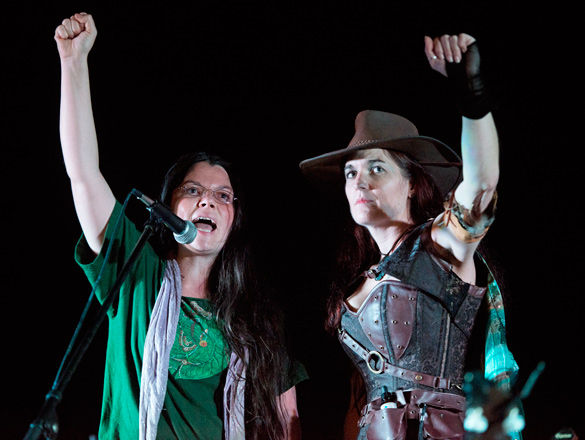Movement in the Music

October 17, 2013
Environmentalists, musicians rally in Cobden to protest fracking
Enviornmentalists, musicians and concerned residents gathered at Cobden’s Trails End Lodge Saturday on a beautiful and mostly clear 72-degree October evening.
Their message: Keep “fracking” out of southern Illinois.
Advertisement
“We do not need to have these oil wells all over our beautiful southern Illinois,” one speaker shouted to a group of supporters on the moonlit stage.
The potential of hydraulic fracturing — or fracking — has been controversial in southern Illinois for several years because of its possible use in the Shawnee National Forest and surrounding areas. The process involves drilling a pipeline underground where fluids are pumped at high pressure until the shale rock deep beneath the surface cracks, causing natural gases to leak to the surface for use as energy sources.
Some lawmakers and business owners see it as a potential economic driver to an otherwise stifled Illinois economy, because it creates jobs and the oil and natural gases are valuable. But opponents have environmental and health concerns.
The fluid used is a combination of water, sand and various chemicals including methylamine, lead, mercury and formaldehyde. However, up to 600 chemicals can be used and many of them are difficult to get rid of after the fracking is completed.
Fracking opponents gathered inside and outside of the lodge to hear stories from people who had their lives directly impacted.
“One day I walked out onto my land and took a deep breath and I fainted,” Susan Wallace-Babb, a western Colorado resident who performed a short puppet show protesting the mining, said.
“The next day I was really sick. I had a burning rash all over my body. It turns out that’s because gas condensate from the production process, a tank of that had overflowed. It’s been a long time now and I am still sick. My doctor says I was poisoned,” she said.
Advertisement*
Wallace-Babb connected her sickness to the oil spill after other area residents reported having similar symptoms.
While the speakers moved the crowd with stories about fracking and its effect, the folk and bluegrass bands gave the audience a pulse as people danced arm-in-arm on the damp grass under the mild, moonlit skies.
First up were the revamped County Graves. The folk quartet, led by guitarist/vocalist, Travis Newton, strummed and plucked their instruments vigorously and with purpose.
“There’s a lot more people in southern Illinois with brains than there are who want fracking,” Newton said.
In the song “Arkansas,” Newton replaced some lyrics with others suited for the event.
“I’ll be sitting in hell with my friends fighting fracking,” he sang as the crowd hollered out in support.
Newton showed up to play despite being limited to walking with a cane because of a recent injury; he joked about it with mandolin player Ben West on stage:
“You’ll have to excuse me if I waver and fall a bit, I’m in a wee bit of pain—I’ll live,” Newton said.
“Can you hold your cane and play guitar at the same time?” West asked.
“I tried. Prop me up against it,” Newton said.
“I can do that,” West said.
Next was Hobo Knife, who came out playing with a bit more of a menacing sound. The dueling guitars screeched and howled while the mandolin danced around with the ukulele. The bass, keyboards and drum kept the pace high-tempo and upbeat.
“The only reason to live here is for the nature — it ain’t for the employment,” guitarist/vocalist Mortimer Bustos said. “So we’ve got to do something about this. This is my hometown,” Bustos said before the band of seven played a song about a man who comes back from the future after an apocalypse—The Tall Tale of John Teeter.
The Woodbox Gang opened the final set with “The Panther Song”—a fast-paced bluegrass tune with a prominent banjo lead. The bass sounded thick and is a bit funky; the drummer strummed the washboard and simultaneously played cymbals.
Their song, “Eat, Drink and Be Dead,” is a toe-tapping jingle reminiscent of an old Bo Diddley tune and had the audience singing along with the lyrics, “Raise your glass above your head, eat, drink and be dead.”
Other speakers brought their own talents to support the cause. A native to the Shawnee National Forest, Barney Bush was born on the land that is being threatened; his family has been indigenous to it for over two centuries, he said.
“How can you destroy the water? How can you destroy the air? How can you destroy our old graveyards and destroy our old village sites with the impunity and consent of government,” Bush said to a crowd outside of the lodge.
Bush is a poet who tries to use his talent to make a connection with people who are in need.
“I thought that I was writing poetry to direct it to the consciences of human beings,” he said. “That’s back when I assumed everyone had a conscience. We have to realize that the corporate heads are people basically without conscience. You cannot say that a person who is going to destroy the water that we drink has a conscience.”
Bush said, according to historians, his ancestors crossed the Wabash River to Shawnee Town in 1809; however, his grandparents told him that his ancestors arrived after being pursued by colonial militia in 1810 when indigenous people set up a union to resist colonial invasion.
Another environmentalist said he has felt the effects of fracking despite there not being mines in his area. Robert Nehman helped found the Allamakee County Protectors after silica sand extraction began in his town in northeast Iowa.
“My neighbor stopped by my house one day and knocked on my door. He told me my day was going to get a whole lot worse,” Nehman said.
Nehman said the pure silica particles are used because they hold up to the pressures of fracking. Millions of tons of sand are strip-mined from mountaintops and then shipped to fracking sights. He said that a million pounds of sand could be used for one fracking job and can be done in stages. Consequently, the lands from the sand extraction sights are left depleted and fruitless.
“A lot of the mining companies say they are going to reclaim the land,” Nehman said. “We don’t want to see it reclaimed, we want to see it restored back to the natural habitat in which it first was. What’s happening is that you can’t.”
Nehman said the sand is so valuable in its natural habitat because it filters the drinking water. Without the sand, runoff and farm chemicals run into aquifers, which can contaminate the water, which is detrimental to the environment and human health.
Apart from the speakers and artists, a silent auction and raffle were held at the festival in which a 1920s “banjolin” (mandolin shaped as a banjo) was auctioned off. Other prizes included a trip to St. Noel Lodge at Camp Ondessonk, a poster signed by Iggy Pop and several gift certificates. The money raised went to SAFE —Southern Illinoisans Against Fracturing our Environment.
Advertisement







